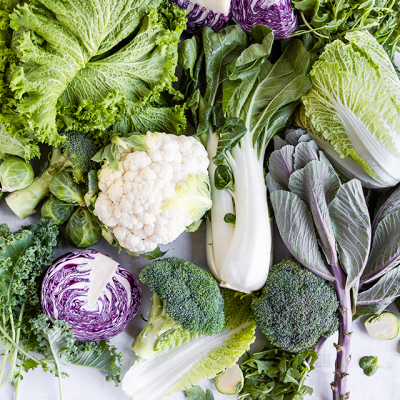In case you need any convincing on more reasons to add veggies to your diet, please consider the incredible health attributes of cruciferous vegetables. These veggies include broccoli, cauliflower, cabbages, kale, and Brussels sprouts as well as many other veggies that may surprise you like radish, rutabaga, arugula and broccoli sprouts too. Veggies, in general, are a high fiber, high density, and low carb food, but cruciferous veggies specifically have a few key features that make them undeniably the next best thing.
They have a few particularly powerful plant chemicals beneficial to us. They contain high amount of glucosinolates which are broken down into biologically active nutrients important for your body, sulforaphane, and indole-3-carbinol. Indole-3-carbinol has many implications in the prevention of cancers and improving immune system function. Sulforaphane is a type of sulfur-containing compound that benefits your health primarily by reducing oxidative stress and supporting liver function, essentially helping the body detoxify itself.
Cruciferous veggies are the gold standard when it comes to detox. They support the main organ responsible in the cleansing of the body and hence, are necessary if you want to remove the debris from autophagy — the self-cleaning mode each cell is capable of. Cruciferous veggies supply the nutrients (antioxidants) that complement autophagy and improve the mechanisms by which cellular toxins are removed.
In summary, here are just a few beneficial characteristics of these healthy veggies:
- Potent anti-inflammatory foods that switch on antioxidant genes and enzymes
- Liver supportive
- Hormone balancing, especially for women. Studies have shown higher excretion of estrogen metabolites with high intake of indole-3-carbinol
- Protective against cancer
- Good source of prebiotic for healthy bacteria
- High in vitamins and minerals including vitamin A, C, and K
Following a ketogenic diet or watching your carbs? These veggies are low in carbs:

The most impressive by far of this class of veggies is sprouted broccoli, containing 10 times the amount of sulforaphane available in actual broccoli, which is the next best thing. Sprouts, in general, make most foods more digestible and increase the availability of the nutrients, but the particularly high levels of sulforaphane in broccoli sprouts help initiate detoxification and antioxidant pathways to help eliminate toxins, a real superfood!
How to buy and store
Cruciferous veggies are best bought fresh and their leaves or texture should be firm and crisp. Broccoli, Brussels sprouts and kale should also have their color more or less intact (not yellow) and they are best stored raw in perforated paper or lightly cooked in glass in the fridge.
How to cook and eat
The best way to cook these vegetables to retain their nutrients is by steaming them for 3 to 4 minutes (less if kale). This cooking process also improves their digestibility. Avoid over-cooking these too much (they should still be slightly crisp) to keep their nutrients intact. You can steam a big stock of veggies and store in your fridge for three to four days. They come in handy for salad additions and snacks. Don´t miss out on the stems and leaves either! These extras are just as beneficial and are great additions to soup stocks.
Roasting caramelizes their natural sugars, so broccoli, cauliflower, and Brussels sprouts can be a family favorite by simply placing them in the oven with healthy fats like olive, avocado or tea seed oil as well as unrefined coconut oil too. Toss with some salt, pepper, and even a bit of turmeric for a simple, fast, tasty and healthy side or salad.
Thyroid concern?
There’s a lot of chatter among my girlfriends whether cruciferous veggies come with a caution for thyroid conditions. Essentially, I’ve learned from my doctor friends that the controversy has to do with the glucosinolate content which is thought to inhibit the intake of iodide — a necessary nutrient for thyroid function. Luckily when you cook these veggies you inactivate most of the glucosinolates by almost 80% and still preserve the beneficial active nutrients. My colleagues in the medical field have reminded me to keep in mind that you’d have to eat a high volume of crucifers for them to truly have an impact, so even if you do have a thyroid concern the need to limit these guys isn’t really scientifically validated. Their advice: the benefits far outweigh the risks when it comes to eating a couple servings of crucifers daily, but of course always check with your doctor if you have a thyroid condition.
I enjoy several cups of a variety of crucifer veggies daily and I hope after learning about how important their nutrition is for your health not to mention how easy they are to prepare, that you too will join me in enjoying one of my favorite ways to take my daily food as medicine!





